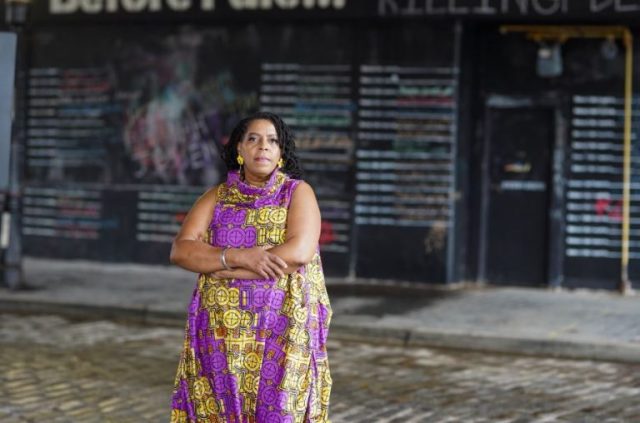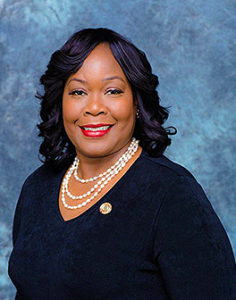
By Je’Don Holloway-Talley | For the Birmingham Times
As the nation observes National Domestic Violence Awareness Month, Tina Thornton, founder and director of SOLE Recovery LLC (Survivors Overcoming Life Experiences), wants to focus on black women who face disproportionate rates of intimate partner violence (IPV). , according to national data.
The mother of three knows what it’s like to be in an abusive relationship. She tried repeatedly to leave a 22-year marriage. “I couldn’t even use the phone in my home, my ex-husband had taken them away… and my family wasn’t a place where I felt I could share what I was going through; they had no idea about anything I’d come across,” she said.
That led Thornton to start her group in 2003, which began as a small, informal ministry that allowed a group of women to come together and share their stories in an event room at a local hospital. SOLE’s faith-based, holistic approach to treatment allows people to resolve their issues or find refuge, she said. “There’s a lot of self-reflection to encourage them to step beyond what they’ve been told or what they believe.”
According to national data, 45.1 percent of black women will experience physical violence, sexual violence, or stalking by an intimate partner. Between the ages of 18 and 35, they are most vulnerable and are 2.5 times more likely to be killed by men than white women, with 92 percent of these black women knowing their killer.
Building a support system for survivors
SOLE’s work has caught the attention of community leaders, including Jefferson County Commissioner Sheila Tyson, who has supported the group since its inception. “The work I have with SOLE Recovery is at the community level… I was doing volunteer service with Tina Thornton [since 2004]by getting them different meeting places,” Tyson said.
Since being elected to the commission in 2018, Tyson said she has received numerous calls from residents in her district about domestic violence.

“We’ve had several incidents where a woman and her children needed help, like one case where the victim had to be in a hidden shelter where the husband couldn’t find them and SOLE Recovery found a place for her to live,” Tyson said . “[Whenever] we get referral calls when women need help we call [SOLE Recovery].”
Tyson said she saw friends mask the pain of domestic abuse as children, and now that she’s able to provide resources to help, she will.
“I saw it every day growing up. Not from my parents … but from my peers that I grew up with,” Tyson said. “We grew up around him, but it was a secret he kept in his home. I knew it was wrong, but there was nothing I could do. And now that I’m an adult and can deal with some of the issues and get some support and help for them, I’m ready to do it.
ministry
In addition to being a support system, SOLE also serves as a ministry. Thornton’s background includes a bachelor’s degree in human services and psychology from Upper Iowa University, and she is currently pursuing a master’s degree in counseling.
For women in need of housing, SOLE partners with One Roof, an initiative focused on ending homelessness in central Alabama, and works closely with the YWCA and Salvation Army to provide emergency shelter, clothing and essential items. “We also utilize the Grace Klein Food Bank and have developed a relationship with the Birmingham Police Department to expedite the provision of emergency housing resources when needed,” Thornton said. In addition, SOLE Recovery helps survivors obtain bus passes to help with transportation.
One of Thornton’s biggest challenges, she said, is helping women overcome the mental and emotional barriers that keep them tied to abusive relationships, often rooted in generational trauma from witnessing or experiencing domestic violence. These patterns can be difficult to break without support.
“Women can be in denial about their circumstances and believe their focus should be on saving the man and giving him the tools to change,” Thornton said. “They think they can create a person like Build-a-Bear. Women don’t understand the basic dynamics of DV and how it relates to anything [they’ve experienced] and how it promotes the narrative, subconsciously, so that they are part of the same. I encourage them to understand that their true identity is not found in man, but in God,” Thornton said.
Thornton stresses the importance of recognizing the signs of domestic violence. “From an observational perspective, watch out for people who are withdrawn, isolated from close friends and family, and only see each other when they are in the presence of their partner…” she said. “If someone is constantly being watched, if their appearance or way of speaking changes dramatically, or if they seem fearful, these are quick indicators of abuse.”
Thornton also advised the community to be on the lookout for behavior that could signal a potential perpetrator.
“If someone is always criticizing what you’re wearing or objecting to non-offensive language they find offensive, that’s a red flag,” she said. “Someone who is overly jealous is constantly telling you who not to trust, trying to control your money or even possess it. And if you are being sexually dominated against your will, these are clear signs of a perpetrator. Also, if he’s a quick romantic and pushes you into a relationship, that’s also a red flag.
Survivors Overcoming Life Experiences (SOLE) Recovery is currently on Facebook and people can contact the Facebook page to inquire about their services. Tina Thornton can be found at [email protected].
